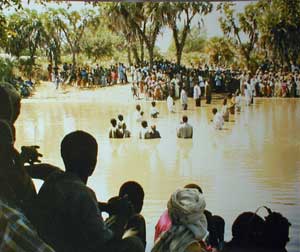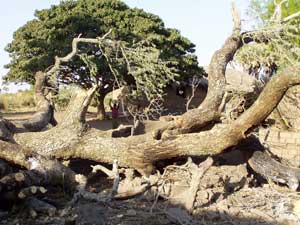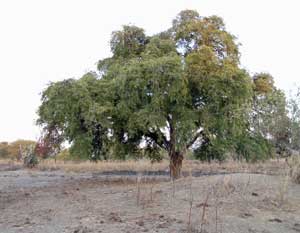
[Home] [Archived news updates and letters]
Of Bees and BaptismBaptisms for the Protestants in Kwongland are a carefully calibrated affair. There needs to be enough water in the pond to dunk the new converts, but seeing as how no one knows how to swim, not so much as to risk drowning Ďem. Those constraints leave a window of about 2 or 3 weeks around the beginning of December during which all the Christians from Kwongland have to get organized enough to be at the same place at the same time to perform the rite en masse. After this there isnít enough water, and before this there is too much. Of course the Catholics donít labor under any such constraints since they sprinkle, and from a purely pragmatic standpoint, they might be onto something here. Be that as it may, the magical day for Kwong Protestants had arrived and we together with half a dozen passengers piled into our truck this past Sunday for a short trip up the road to the village of Danang where 51 new Kwong believers from 20 churches were to make their confession of faith in the local pond. The first sign that something was amiss was the sight of a young man walking towards us with the collar of his jacket hitched awkwardly over his head. It seemed strange, but then again with the temperature dropping into the mid 60ís at night, people were bundling up, so we momentarily thought no more of it. That is, until 100 yards further up the road two more men came running towards us at full tilt with their arms flailing madly about their heads, as they wildly gesticulated at us not to stop. Of what we suspected, there was now no more doubt Ė a swarm of killer bees was attacking the people who had gathered at the church before going to the pond for the baptismal ceremony. Shortly, the bees started bouncing off the windshield of our truck, and as we passed the church, we could see pastors and parishioners pouring out the front door like ants out of a flooded nest, their arms flailing wildly about their heads like the first fellows. We continued half a mile up the road past villagers who were hastily starting large smoky fires to stop the bees until we came to the far end of the village where we pulled over. Explanations varied, but centered around the theories that the church people had put on too much cologne and perfume or that they were making too much ruckus with their drums and dancing. Both were doubtless true, and we can certainly vouch from personal experience for the former of these theories, as can anyone who has been naÔve enough to wear scented sunscreen in the African bush. And as to the danger of these bees, we have heard first-hand accounts of a donkey being killed by them, and of an elderly man being rescued from certain death by them. After an hour and a half, word came that the pastors and baptismal candidates had assembled at a different pond a safe distance from the church and the bee tree. We headed back down the road in that direction, and passed the church where all manner of abandoned knapsacks, headscarves and flip-flops littered the road. We arrived safely at the appointed pond and the baptism passed off without further excitement. It turns out that many people were badly stung. An Arab merchant selling his wares on a mat along the road apparently had a serious allergic reaction and our translator Josephís daughter was rushed to the clinic for treatment, but so far as we know, no one died. After the baptism was over (nobody drowned) it is tradition to have a service at which the newly baptized believers partake of their first communion. Of course nobody was too keen on the idea of going back to the church and the adjacent bee tree, so all 3 or 400 of us gathered under a nearby Tamarind tree which, while it didnít have any bees, had, on closer inspection, recently sheltered a large number of bovines whose intestinal tracks were apparently in good working order. Nevertheless, everyone found a place on the ground between the you-know-whats, and the Kwong believers enjoyed their one chance in the year to celebrate together the suffering, death, and salvation of their Lord. |
We didnít have a camera to record the excitement of the Bees and the Baptism, but this is a baptismal service some years ago. Like everything else in rural Africa, it looks about same yesterday, today, and probably forever.
A few days later, we were in Danang again, and this time we had a camera with us. We were dismayed, but not exactly surprised to see that the bee tree had been chopped down and the hollow part of it where the bees lived burned out. Some Chadians are the worldís worst environmentalists, but at least in this case, you canít blame them for being practical.
The Tree of Bovine Rest and Communion. |


